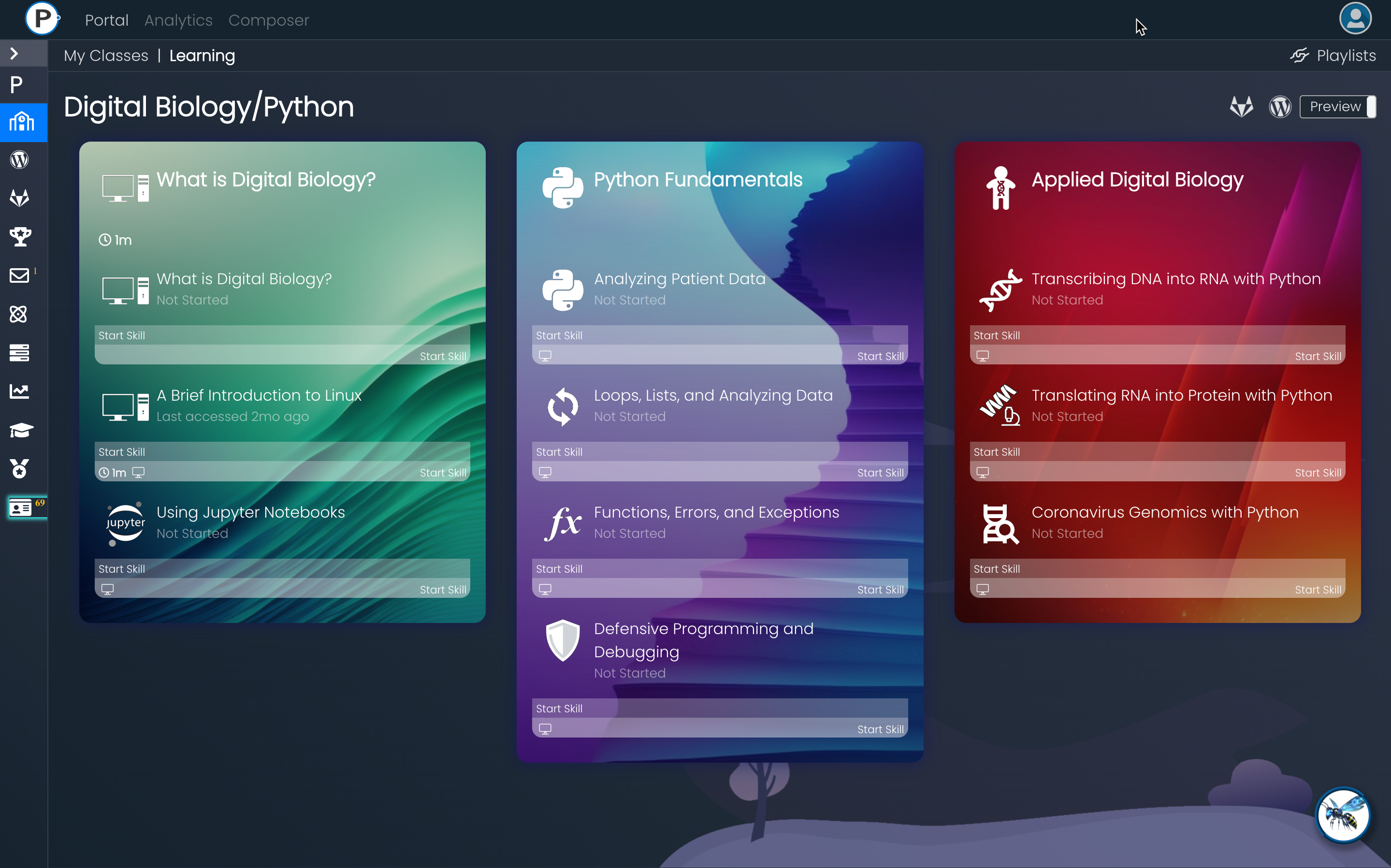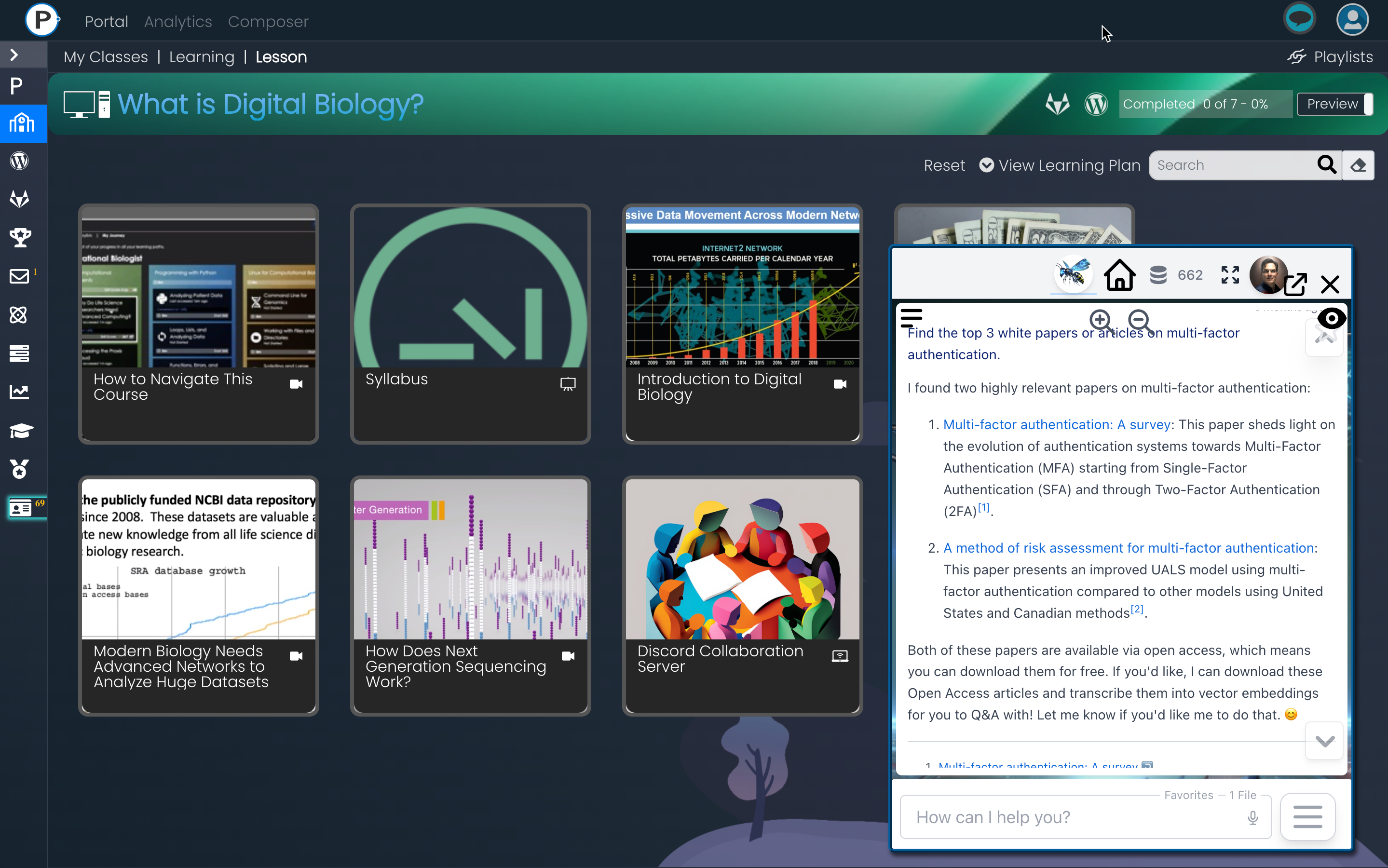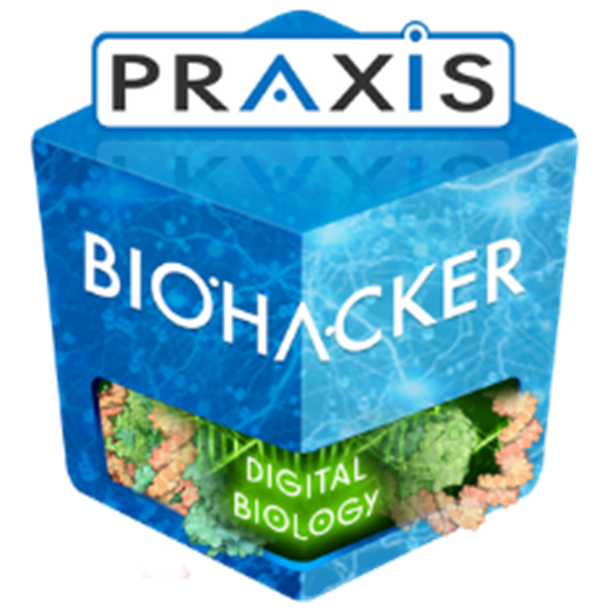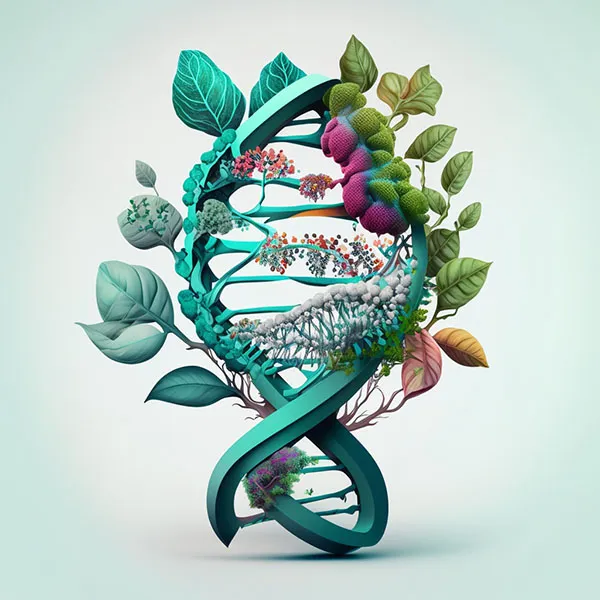Digital Biology / Python
World-renowned professor and researcher Dr. Alex Feltus from Clemson University has built a powerful computational biology journey at New Skills Tech. In this interactive, online journey, students will learn how to use Linux-based computing and the command line, Jupyter Notebooks, and the basic syntax of Python for the purpose of workforce development and research in biosciences.
Course Details
World-renowned professor and researcher Dr. Alex Feltus from Clemson University has built a powerful computational biology journey at New Skills Tech. In this interactive, online journey, students will learn how to use Linux-based computing and the command line, Jupyter Notebooks, and the basic syntax of Python for the purpose of workforce development and research in biosciences.
This course includes application techniques using Python to parse genomics data files, transcribe DNA files into RNA files, and translate RNA files into protein sequence files. Students will also explore the genomics of the Coronavirus and learn to use Python to understand transcription and translation using its genome. Qualifies for the BioHackers: Digital Biology digital badge.
Journey Architecture

The online program is available 24x7x365 via any web browser or mobile device and includes four (4) learning paths, seventeen (17) lessons, and over fifty (50) hours of learning material. Below is a list of the main topics:
●
What is Digital Biology?
●
Linux and the Command Line
●
Python Fundamentals
●
Applied Digital Biology
In the first half of the learning journey, the context of digital biology research is introduced followed by a brief hands-on interaction with a Linux operating-system computer via the command line interface (CLI) in real virtual machine (VM) based labs. There is no need to install Linux on your computer since the fully functional VM runs in the cloud and is accessed via a standard web browser! Next, the powerful Jupyter Notebook is put into each student’s hands which is a go-to method for teaching coding in Python, R and other languages. A deep dive in the Linux CLI is provided so the student becomes an expert in Linux and interacting with a computer via typed text commands which is the best way to use a computer for data-intensive bio-analytics.
In the second half of the journey, students will dive into the powerful and ubiquitous Python programming language. Basic syntax, lists, dictionaries, loops, conditionals, functions, and GitLab are provided in the VM. Students will then synthesize Python micro-skills into fully functional Python code that parses standard bioinformatics format files (FASTA, GENBANK) and performs the transformation of DNA sequences into RNA and then protein sequences. In sum, this course will provide each student with enough working knowledge of Linux and Python to adapt these scalable skills to other digital biology tasks – including research.
Skills and Resources
●
Advanced Command Line Usage
●
Computational Biology
●
Genome Data Mining
●
Navigating Genomics Databases
●
Protein Translation
●
RNA Transcription
●
Biotechnology
●
Data Intensive Computing
●
Jupyter Notebooks
●
Navigating Genomics Databases
●
Python (Programming Language)
●
Workflow Management

Digital Credential

In the first half of the learning journey, the context of digital biology research is introduced followed by a brief hands-on interaction with a Linux operating-system computer via the command line interface (CLI) in real virtual machine (VM) based labs. There is no need to install Linux on your computer since the fully functional VM runs in the cloud and is accessed via a standard web browser! Next, the powerful Jupyter Notebook is put into each student’s hands which is a go-to method for teaching coding in Python, R and other languages. A deep dive in the Linux CLI is provided so the student becomes an expert in Linux and interacting with a computer via typed text commands which is the best way to use a computer for data-intensive bio-analytics.
Following is summary of the earning criteria for the BioHackers: Digital Biology digital credential:
●
Complete 17 hands-on digital biology labs using large bioscience data sets and live computing systems
●
AND – Complete all required learning resources in the Digital Biology online journey – 17 lessons – including, videos, articles, activities, and discussion posts
●
AND – Pass short assessments (80% or better) in all lessons
●
AND – Participate in weekly virtual collaboration sessions with instructor(s), mentor(s), and peers
●
AND – Conduct original computational biology research using the skills, resources, and tools within the Digital Biology journey
AI Content Curation
AI Content Curation
New Skills Tech leverages the latest in AI technology to analyze and curate the best, most relevant and up-to-date learning content from a vast pool of trusted sources.
AI-Powered Hands-on Labs
New Skills Tech uses AI to create a dynamic learning lab that allows students to explore, experiment, and apply what they have learned in a safe virtual setting.
AI-Powered Peer|Mentor Collaboration
New Skills Tech empowers collaboration between students, mentors, and Pria so students can achieve their full potential and make a positive impact on the world.
